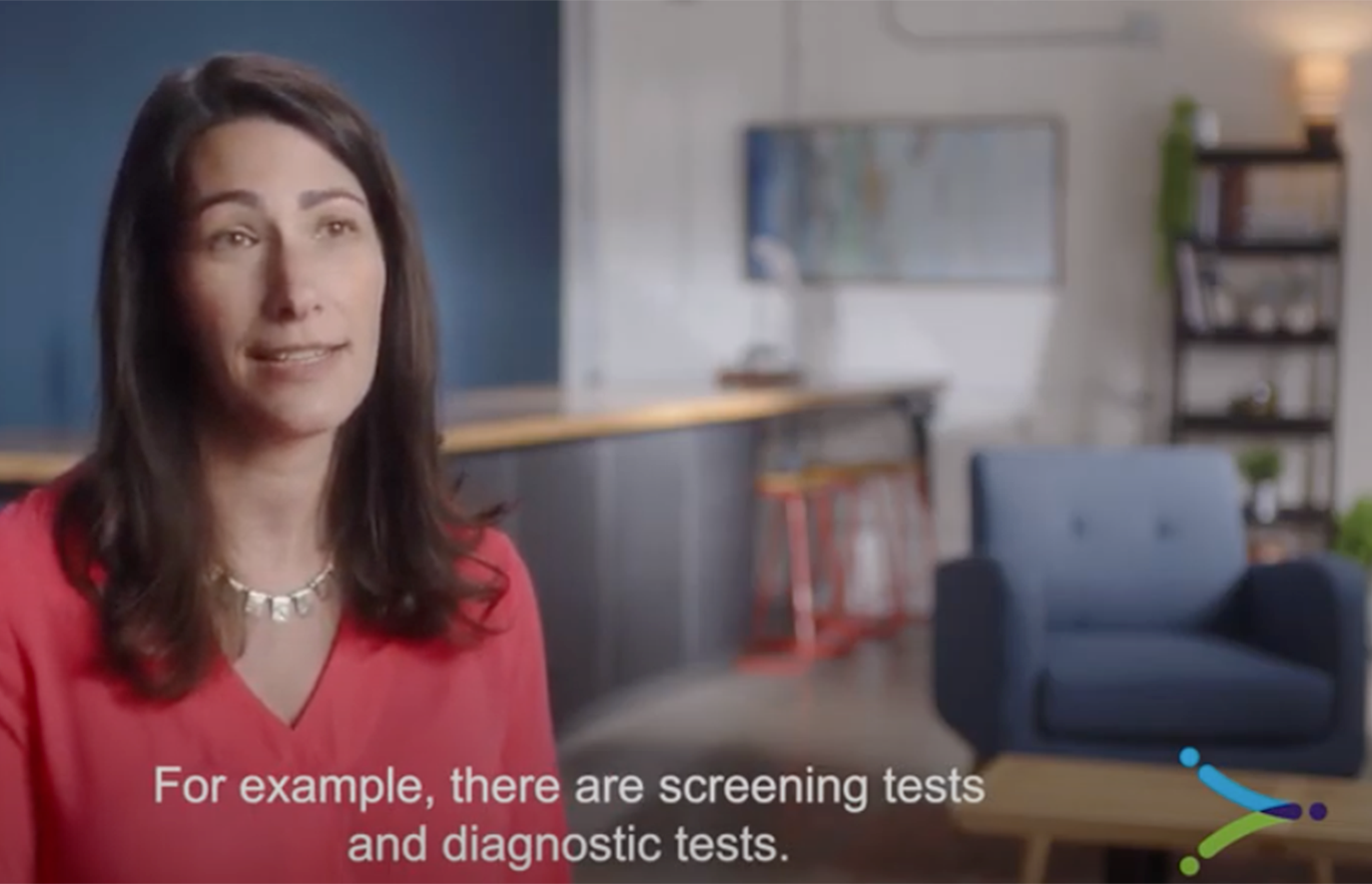Genetic Screening and Testing for Pregnancy in Women Over 35
The chance to have a baby with a chromosome condition, specifically the chance that a baby will have an extra chromosome, or aneuploidy, increases as a woman gets older, with 35 years being the starting point for the term “advanced maternal age.”
Numerous prenatal genetic screening and testing options may be offered to you to assess this chance. It’s important to know the basics of the options you may be offered during your pregnancy, including the benefits, risks and limitations of each. And note that pursuing a genetic screen or test is optional; doing so is a personal choice as is choosing not to.
Learn more about genetic testing and pregnancy.
What Pregnancy Genetic Screening and Testing is Available for Women Over 35?
Noninvasive Prenatal Testing (NIPT)
- Also known as non-invasive prenatal screening (NIPS) or cell free fetal DNA, this option screens for common chromosome conditions, including trisomy 21 (Down syndrome), trisomy 18, and trisomy 13. Sex chromosome conditions and microdeletions can also be included as part of the analysis.
- This screen is done after 10 weeks gestation and requires a maternal blood sample.
- This is a screening test: it will assess certain factors to determine if a pregnancy is at an increased or decreased risk for a particular genetic or chromosome condition. It will not determine if a pregnancy is definitively affected or not.
- If a pregnancy is determined to be at an increased risk, diagnostic testing via chorionic villi sampling or amniocentesis is available to determine if a pregnancy is affected.
First Trimester Screening
- This screen assesses for Down syndrome, trisomy 18 and trisomy 13.
- Done between 11 and 13 weeks gestation, the measurements of two pregnancy-related hormones obtained from a maternal blood sample are combined with two ultrasound measurements to calculate these risks.
- This is a screening test: it will assess certain factors to determine if a pregnancy is at an increased or decreased risk for a particular genetic or chromosome condition. It will not determine if a pregnancy is definitively affected or not.
- If a pregnancy is determined to be at an increased risk, diagnostic testing via chorionic villi sampling or amniocentesis is available to determine if a pregnancy is affected.
Maternal Serum Screen
- Multiple types of maternal serum (blood) screens are available; each is performed in the second trimester. Typically only one type is performed, and usually not if NIPT or first trimester screening has been conducted.
- Each is a screening test: it will assess certain factors to determine if a pregnancy is at an increased or decreased risk for a particular genetic or chromosome condition. It will not determine if a pregnancy is definitively affected or not.
- If a pregnancy is determined to be at an increased risk, diagnostic testing via chorionic villi sampling or amniocentesis is available to determine if a pregnancy is affected.
Integrated Screening
- This screen assesses for Down syndrome, trisomy 18 and open neural tube defects (like spina bifida).
- The first part is done between 11 and 13 weeks gestation, during which the measurement of a pregnancy-related hormone is obtained from a maternal blood sample and two ultrasound measurements are recorded. This is followed by the measurement of four pregnancy-related hormones obtained from a maternal blood sample between 15-20 weeks of pregnancy. A final test result is provided at that point.
- This is not recommended if you have previously pursued either NIPT or first trimester screening.
Sequential Screening
- This screen assesses for Down syndrome, trisomy 18 and open neural tube defects.
- A preliminary risk estimate is provided after measurement of a pregnancy-related hormone is obtained from a maternal blood sample and two ultrasound measurements are recorded.
- If the first-trimester screening result indicates that the risk of a chromosome condition is increased, additional assessment options, such as diagnostic testing or NIPT, would be offered at that time.
- If the risk is lower than the cut-off level, the negative results are disclosed and measurement of four pregnancy-related hormones obtained from a second maternal blood draw occurs between 15-20 weeks gestation, after which a final result is provided.
- This is not recommended if you have previously pursued either NIPT or first trimester screening.
Second Trimester Screening
- This screen assesses for Down syndrome, trisomy 18 and open neural tube defects.
- Done between weeks 15 and 20 weeks, four pregnancy-related hormones are measured from a maternal blood sample.
- This is not recommended if you have previously pursued either NIPT or first trimester screening.
Alpha-Fetoprotein (AFP) Test
- This screen assesses for neural tube defects.
- It is done between weeks 15 and 20 weeks and measures a single pregnancy-related hormone (AFP) measured from a maternal blood sample.
- It is recommended if you have previously pursued either NIPT or first trimester screen.
Chorionic Villus Sampling (CVS)
- During a chorionic villi sampling (CVS), a small sample of placental tissue (chorionic villi) is obtained either transcervically or transabdominally under ultrasound guidance between 11-13 weeks of gestation.
- Systematic review of procedure-related risk has demonstrated that the pregnancy loss rate for CVS is 0.7% within two weeks post-procedure. It is recommended that you discuss the center-specific loss rates with your provider.
- Samples obtained from a CVS can be sent for:
- Karyotype (chromosome) analysis
- Chromosome microarray testing: this can detect deletions (missing pieces) and duplications (extra pieces) of genetic material, which may be clinically significant.
- Testing for a specific genetic condition, if clinically indicated.
- It does not test for all genetic conditions.
- The accuracy of results is >99% and results are typically available within 1-2 weeks of testing.
Amniocentesis
- During an amniocentesis, a small sample of amniotic fluid is removed by placing a needle into the amniotic cavity under ultrasound guidance after 16 weeks gestation.
- Systematic review of procedure-related risk has demonstrated that the pregnancy loss rate for amniocentesis is 0.6% within two weeks post-procedure. More recent literature suggests that loss rates for amniocentesis appear no higher than 1/300-1/500 or even 1/1000, and may be even lower in experienced centers.
- Samples obtained from an amniocentesis can be sent for:
- Karyotype (chromosome) analysis
- Chromosome microarray testing: this can detect deletions (missing pieces) and duplications (extra pieces) of genetic material, which may be clinically significant).
- Testing for a specific genetic condition, if clinically indicated.
- It does not test for all genetic conditions.
- The accuracy of results is >99% and results are typically available within 1-2 weeks of testing.
Genetic Counseling for Pregnancy Over 35
If you are 35 or older, it may be helpful for you to meet with a prenatal genetic counselor in your first trimester. This will allow for an in depth discussion of the prenatal genetic screening and testing options that may be offered to you during your pregnancy, including the benefits, risks and limitations of each. The purpose of this meeting is to inform and empower you to make the most appropriate decisions regarding your pregnancy and prenatal care.
FAQs for Moms-to-Be Over 35
Do I Need to Do Genetic Screening or Testing During My Pregnancy?
Although you do not need prenatal genetic screening and testing, your healthcare professional may recommend it. It can be especially helpful for women over the age of 35, who have a higher chance for developing pregnancy-related issues.
Are you currently pregnant? Learn more about prenatal genetic testing.
Is Amniocentesis Necessary After 35?
If you are 35 or older, your healthcare professional may advise you to consider an amniocentesis. However, many other prenatal genetic screening options – such as NIPT – are now embraced by women and healthcare professionals because they are less risky, can be performed earlier in the pregnancy, and are still very sensitive to picking up particular chromosome conditions.
Does Insurance Cover Prenatal Genetic Screening or Testing for Women Over 35?
The ultimate out of pocket cost of genetic screening or testing in pregnancy depends on what testing is pursued and what the specific insurance plan covers. It is recommended that you talk with your insurance company to best understand what will, and will not, be covered and at what percent.
Learn more about the cost of genetic testing and pregnancy.
I Am Over 35. Should I Get Genetic Screening or Testing Before Pregnancy?
Though assessing a baby’s risk for aneuploidy as it relates to advanced maternal age is not possible prior to conception, carrier screening, which analyzes your DNA to see if you are a carrier of certain genetic conditions, can be done prior to pregnancy. Carrier screening is available to women of every childbearing age and tends to only be done only once, not with every pregnancy.
Carrier screening can be performed on a blood sample, saliva sample, or buccal (cheek) swab. Ideally, carrier screening is conducted prior to pregnancy, but screening can also be done during the first and second trimesters.
Carriers of genetic conditions are typically healthy and often do not know they are carriers. If both parents are carriers of the same genetic condition, or in some cases if just the biological mother is a carrier, then there would be an increased risk for their baby to be affected.
Some common genetic conditions screened for include:
- Cystic fibrosis
- Spinal Muscular Atrophy
- Tay-Sachs disease
- Sickle cell anemia
- Fragile X syndrome
If you are found to be at increased risk to have an affected child, reproductive options such as in vitro fertilization with preimplantation genetic testing, egg/sperm donation, or diagnostic testing during pregnancy are available. For more information on these testing options, visit preconception genetic testing.
Although carrier screening can assess if you are at increased risk to have a child with certain genetic conditions, it does not screen for all possible genetic conditions and does not assess risks for chromosome conditions, birth defects, or intellectual disabilities.
In addition, you may choose to proactively meet with a genetic counselor if you have concerns about a personal or family history of a birth defect, genetic condition or chromosome condition. Doing so may provide you with a better understanding of your risk and the availability of appropriate screening and testing options.
If you are struggling with infertility, you may also want to consider preconception carrier screening. Visit our page Can You Test for Infertility? to learn more.







